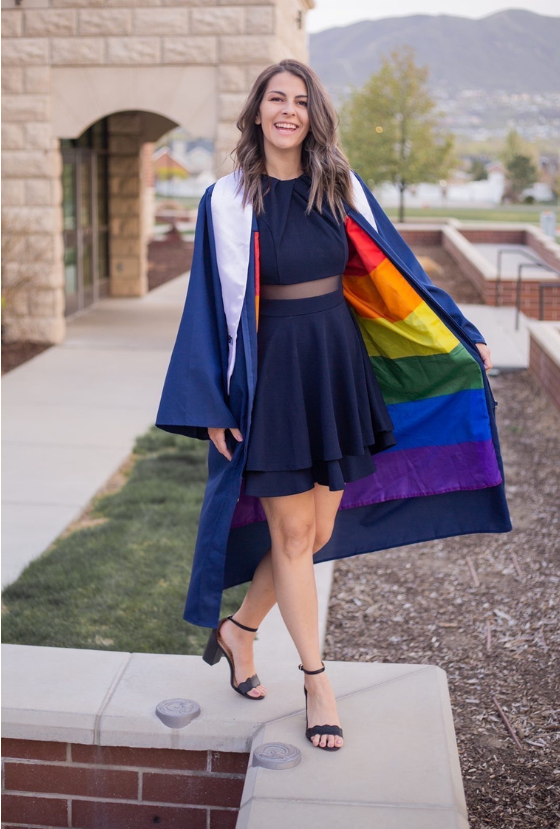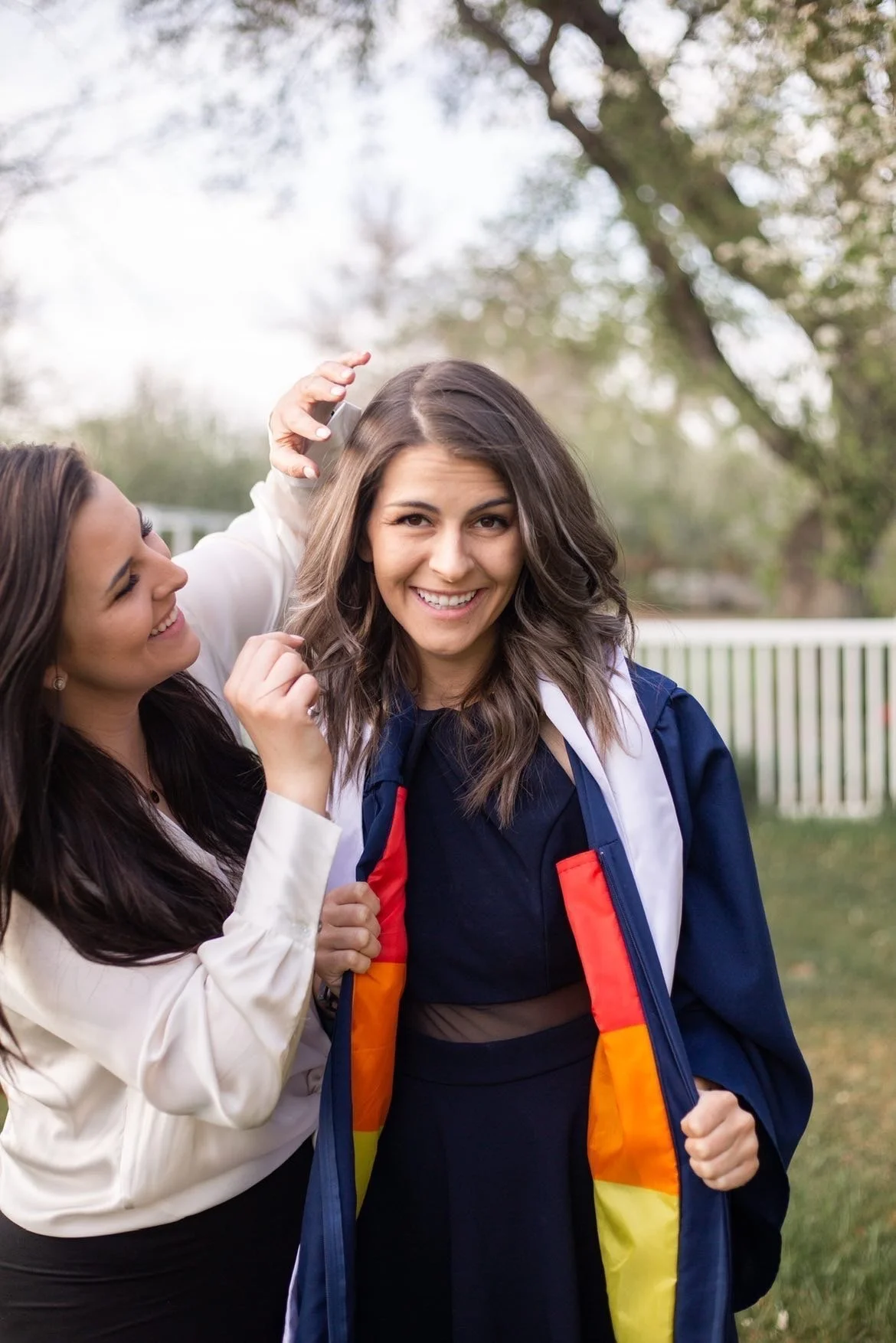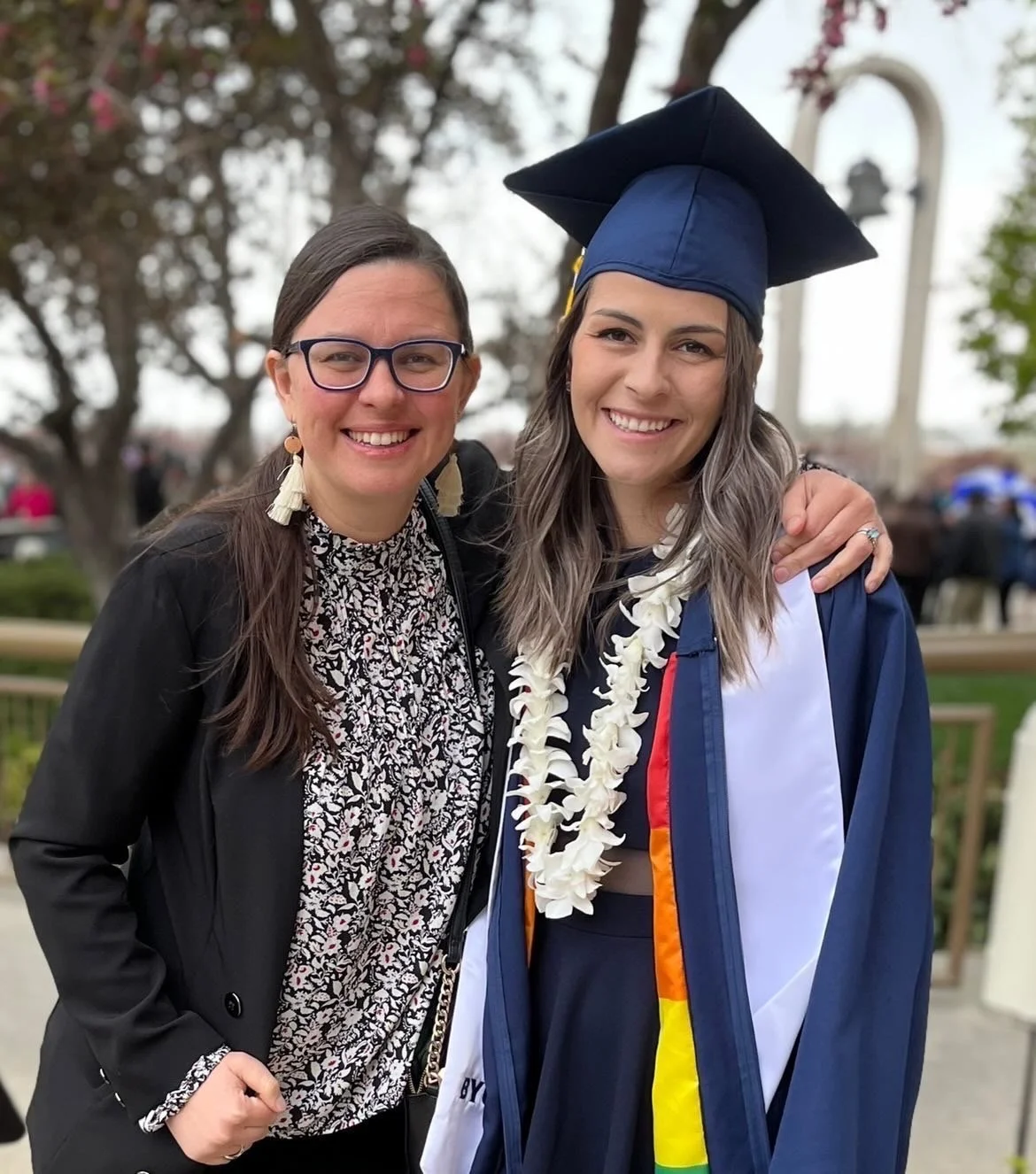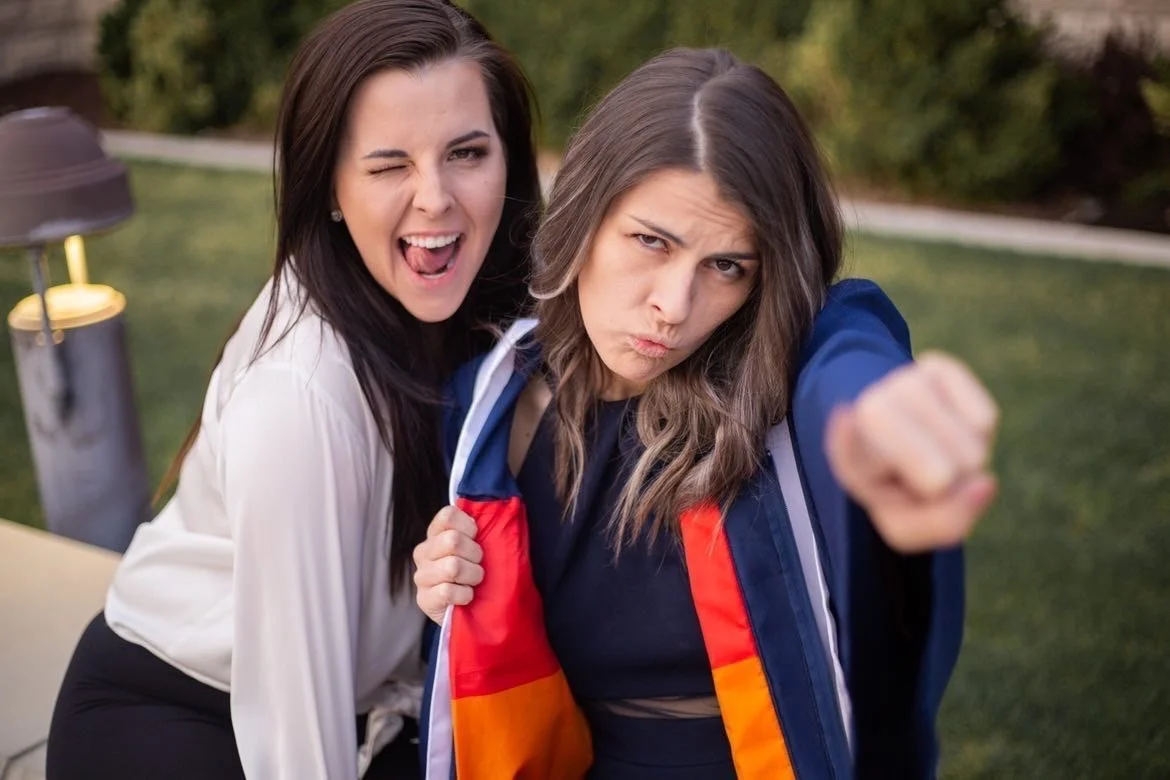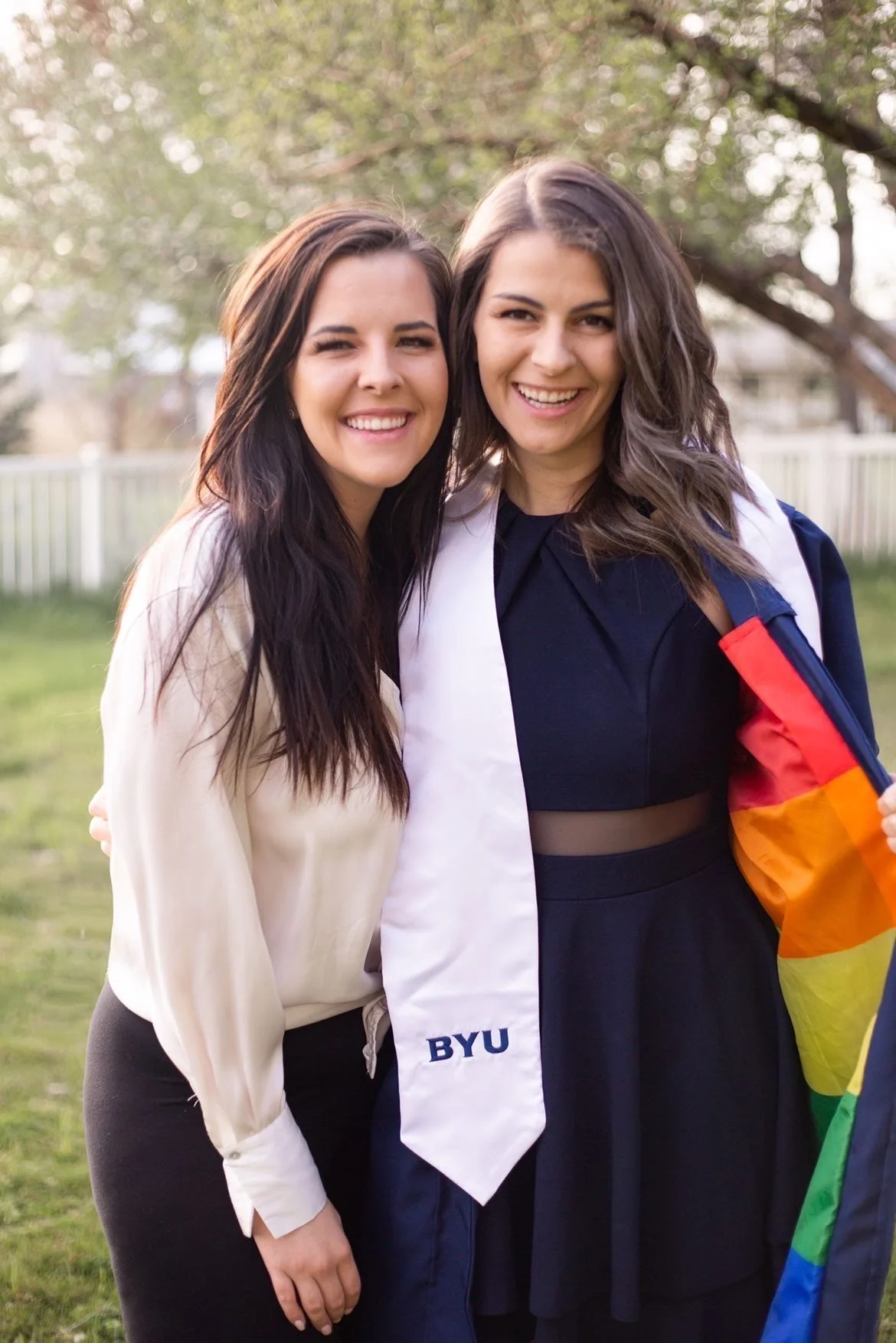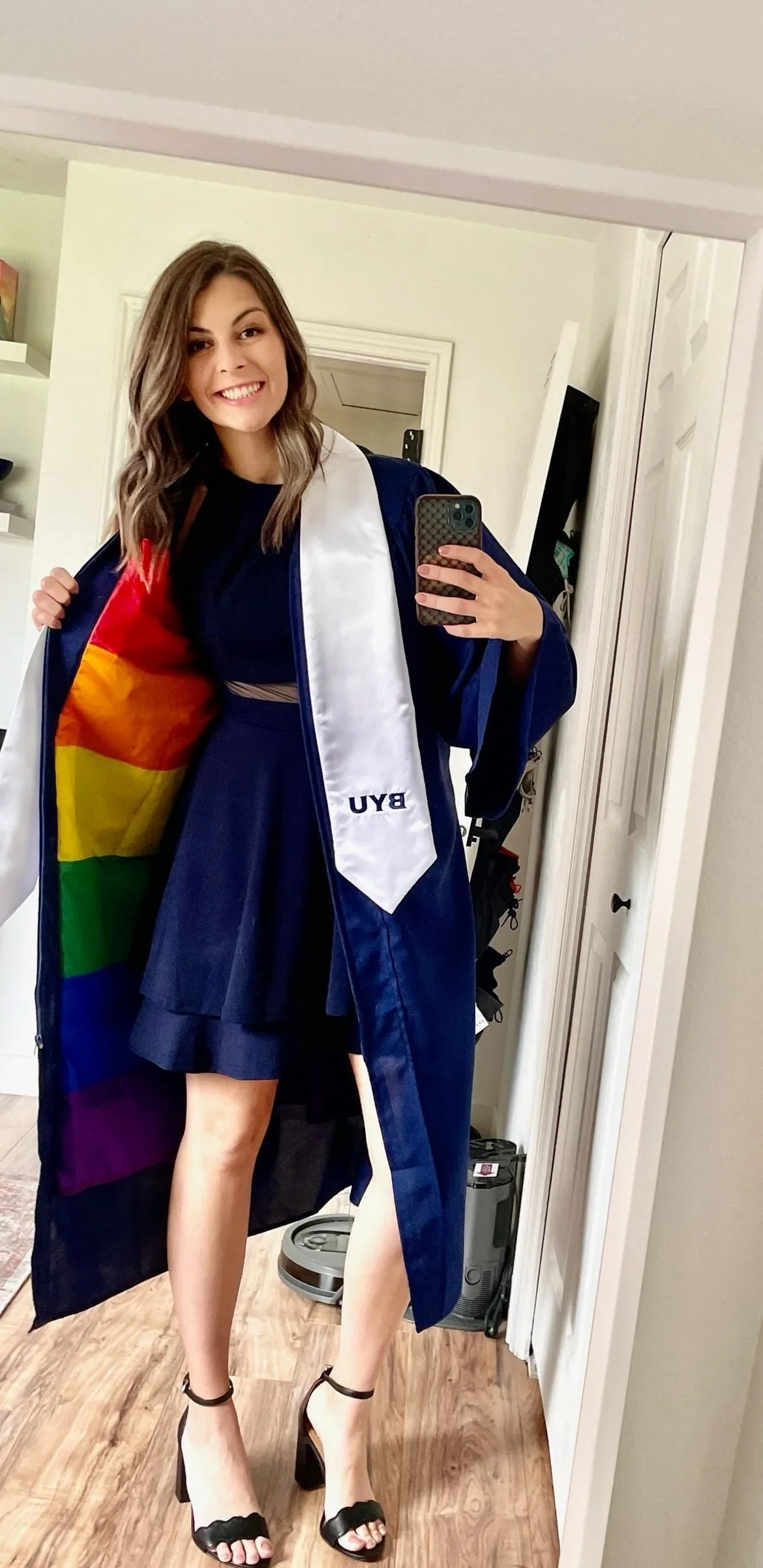“I didn’t commandeer this,” says Jillian Orr, the BYU graduate who recently made national headlines after flashing the rainbow-flagged lining of her Cougar-blue robe as she accepted her diploma. “I made a statement, and the world picked it up, because what is going on at the university is clearly unacceptable.”
Jillian’s now viral robe reveal was intended to be a civil protest of policies that made her experience at BYU less than comfortable, and at times downright painful as an LGBTQ+ student.
It was Jillian’s younger sister who first came up with the idea for the subtle statement. After seeing Jillian break down in tears after a troubling survey she took in a BYU marriage and family class in which her multiple choice answer of “loving our LGBTQ brothers and sisters unconditionally and accepting whatever they want as what is best for them” as the appropriate way to behave was marked wrong, Jillian’s sister suggested she wear a rainbow dress to graduation. “Nah, not my style,” Jillian thought. But she was intrigued by the idea of a Katniss Everdeen girl on fire/Cruella Deville at the party-esque reveal in which one’s wardrobe did the talking. “Kind of an, ‘I will stand against you, and you can’t do anything about it because everyone’s looking at me’ kind of way.”
The day before commencement, Jillian’s older sister dug out her sewing machine to do the handiwork. Jillian admits she was nervous, wondering if she’d be tackled or escorted offstage. But instead, it was a quick, quiet moment that all became worth the risk shortly after graduation when another female student approached Jillian and said, “My girlfriend saw you do that, and she wanted me to thank you.” Since, Jillian’s moment has gained momentum as a Tik Tok video attracted the eye of national news syndicates including CNN, People, Good Morning America, The Today Show, Teen Vogue, NBC, ABC, and every news station in Utah (besides Deseret), who have since covered the story. Which, diploma in hand, Jillian is now ready to tell.
The 28-year-old graduate in psychology was born and raised in Farmington, UT, the fifth of seven children. Her parents met at BYU, and her mother – a once orthodox Catholic who converted to the LDS faith – applied her music major to making every morning in the Orr household a music-filled devotional, complete with scripture reading, prayer, and song.
Jillian was a driven, ambitious, assertive kid who questioned things and sought out challenges.
“When something scares me, I want to run at it. That’s how I handle things that frighten me.” As a young child in Primary and into Young Women’s, Jillian offered to teach lessons, and frequently told her bishops she’d be happy to fill in as a last minute speaker, if needed. Jillian served a mission in Eugene, Oregon where she had multiple leadership roles, and later served in the temple for two years. She became an institute teacher, and once thought she’d end up a mission president’s wife, which would provide her more opportunities for public speaking and working with youth – her passions.
Career would come first for Jillian in her 20s, and she took early steps to go into the field of change and empowering people. Along the way, she worked with youth in rehab centers, where she discovered she was more interested in preventive care than rescue/rehab work. She worked at an after-school program, and after saving enough money to go to college, she entered BYU because they had “the best psychology program.” Indeed, she loved her studies including many “awesome psychology teachers” she met with in person before COVID required her studies to go mostly online.
It was during the pandemic that Jillian started to recognize that the feelings she had for her long time best friend – a girl – were more than platonic. And they were mutual. And that’s when some cognitive dissonance began to set in. She relates, “We both recognized what this was, but we’d been taught it was wrong, a sin. My understanding, being raised in the church, was as long as I don’t act on this, I’m not wrong; I’m not homosexual. Like if you don’t drink, you can’t be an alcoholic.” Jillian began meeting with a mentor who helped her see that her feelings weren’t something to be avoided, but were in fact a part of who she was. Jillian came to recognize that, “These so-called ‘demonic temptations’ had become a beautiful part of who I was. And it would be a gift I could later empower other people with.”
As she became more in tune with her bisexuality, Jillian began to more clearly identify the harmful toll some of her classes were taking, particularly her marriage and family courses. Of the way some professors spoke of LGBTQ people in a “They will never be as happy as the rest of us” manner, Jillian internalized how that felt for her and other LGBTQ students around her. While she’s grateful for some professors who introduced themselves as allies and safe spaces, others made it clear they would not be teaching any form of LGBTQ inclusivity if it contradicted church teachings – even if it meant being misaligned with the current ethical standards of the American Psychological Association. At one point, Jillian refused to write an assigned paper on why marriage is only between a man and a woman, instead taking the fallout of a failing grade. “The professor didn’t say anything; they just moved on.”
In contrast, Jillian’s entire family has been extremely supportive and affirming, for which she’s grateful. “They’re riding the roller coaster with me.” Her older brother came out as gay five years before, and the family acknowledges that when it was Jillian’s turn, things were handled better. “Props to him for being the maverick,” she laughs. The entire Orr clan, her “pit crew,’ travelled in to Salt Lake for Jillian’s recent graduation party, hosted by her and her girlfriend. Festivities included a mechanical bull and a lot of laughter.
Jillian has now resumed her career by overseeing the largest nonprofit after school program in Utah, working as the area director for the Boys and Girls Club. She’s grateful to work at a place that values inclusivity and positivity. As for her church affiliation, she’s finding comfort in letting things go and moving on. “In reflecting on the covenants between God and I and what He’s taught me about my sexuality, I’ve realized so many things I was once taught don’t line up with His truths. If I got married to my girlfriend, even if I begged to stay, I’d be kicked out of the church. It doesn’t seem like something Christ would do.” After two rounds of discovery, both with LGBTQ issues and some troubling bouts of church history, Jillian has felt it best to step away, saying, “I can no longer affiliate with an organization that treats people like me this way.”
When asked how others can implement best practices in the mental health space, Jillian says, “I want people to be able to hold space for others and ask what’s important to them, and not have an alternative narrative about what they think it should be. If you hold space for someone in love, they will navigate where they’re supposed to be faster. For those trying to navigate, find the next right thing for you and do it. Live it. Authentically. Allow your mess to be your message. And understand you’re going to use it to help other people.”
Her public journey started with the seemingly subtle lining of a graduation robe. But now, Jillian Orr is ready to take the podium to spread her message of inclusivity. “I’m meant to be a voice, and I can take a hit for those who need me to. I’m meant to stand for this.”
photo credit: Hope Orr
















